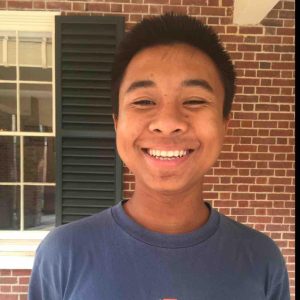June 3, 2021

Student: Beh Reh
Major: Biology
What is your goal in studying science?
Medical school.
What does STAMPS mean to you?
STAMPS has provided me with opportunities to participate in research by assigning a research mentor, providing directions for my future career. I have gained a state-of-the-art research experience at this early stage of my undergraduate education. Through this program, I have been able to develop numerical skills needed for entering graduate school and to outreach to the community to empower youth and high school children of my community on environmental exposures, health, and education.
What advice would you offer incoming students?
Make sure to communicate with your research mentor and get involved in research in any possible ways as available. This will allow you to be creative, competitive, a logical thinker, and able to troubleshoot your weaknesses.
What is your research project about?
I’m focusing on effects of perchlorate, an endocrine disruptor chemical, on primordial germ cells (PGCs, stem cells that produce sperm and eggs later in life) of Japanese medaka fish. Perchlorate is a manufactured chemical compound commonly used in munitions, fireworks, explosives, airbag initiators for vehicles, matches, fertilizers, chlorinated cleaning products, chewing tobacco, and rocket fuel. It is known to affect the thyroid function in vertebrates, including humans. However, the effects of perchlorate exposure on reproductive cells are less understood. I conducted experiments to examine the effect of various concentrations of perchlorate, including concentrations that humans and wildlife are exposed to, on the development of embryos and molecular alterations in the PGCs associated with developmental defects.
What have you found in your research?
I found that perchlorate affects germ cell integrity, causes abnormal migration of PGCs, and induces embryo mortality. I also found that co-treatment with vitamin C can ameliorate perchlorate-induced developmental defects including mortality.
What is the significance of your research?
Understanding the effects of perchlorate on PGCs allows us to understand what level of damage human PGCs exposed to this chemical can sustain. Active-duty military are exposed to this chemical in the theater of war and public exposure can occur in communities adjacent to military training grounds.
Where have you presented your research?
I’ve presented this finding at the Triangle Consortium for Reproductive Biology, National Institute of Environmental Health Sciences in March 2021, and UNC-Greensboro Lloyd International Honors College Symposium, UNCG in March 2021. I also have registered for presentation at UNCG URSCO in April 2021 and an international conference (North American Society of Comparative Endocrinology meeting) to be held on May 25-27, 2021. I will also present a poster at the annual meeting of the Society of Environmental Toxicology and Chemistry in Portland, Oregon in November 2021. Additionally, I am writing a manuscript to submit to Aquatic Toxicology Journal for publication with me as a lead first author.
Did you have any difficulties with your project?
I did not run across any difficulties because my mentor, Dr. Bhandari, strategically guided me through the entire process of the project (from the synthesis of ideas through analysis of data) and graduate students at the Bhandari Laboratory taught me essential techniques for molecular analysis of my research samples.
How has undergraduate research been beneficial to you?
This is extremely important for undergraduate students like me as we join the university like clay and with all these research experiences we emerge as a fully finished and functional pot.
What was the most surprising thing about undergraduate research?
I am surprised to see myself so confident in what I do and capable of public speaking. Dr. Bhandari and the entire research group have nurtured me in various aspects of my scientific life, such as creative thinking, scientific reasoning, troubleshooting, manuscript preparation, oral presentation, and group discussion. I have learnt a lot about the importance of environmental and human health as well as research methodologies and science communication.